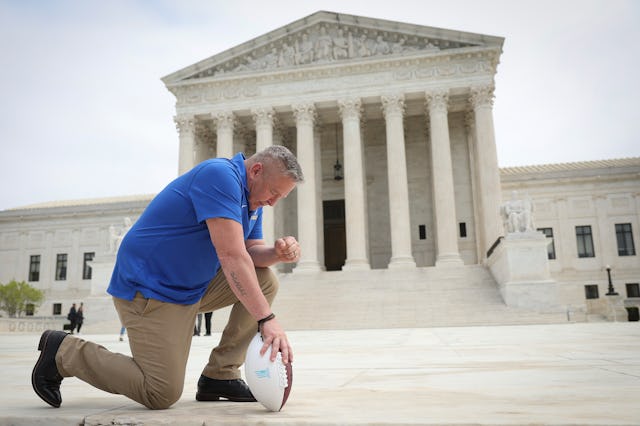School Prayer Is Somehow Back On The Table After A 60-Year Ban
The Supreme Court on Monday heard arguments in a case that could shift the separation of church and state.

There was hope, when Trump lost the election in 2020, that some of the causes that he championed in order to drum up support from the fearful Christian right would fall to the wayside. But his decisive alteration of the Supreme Court means that we, as a nation, may be living under conservative interpretations of the law for many years to come. Long-established, vital precedents, such as the right to abortion, are now under threat, and, on Monday, the court heard arguments in a case that could allow for the return of prayer to public schools for the first time since it was clearly banned in 1962.
The case, Kennedy v. Bremerton, concerns Washington state public school football coach Joseph Kennedy, who was removed from his job after to refusing to put a stop to his practice of leading students in silent prayer at the 50-yard-line after football games. The coach was also known for infusing his motivational speeches with religious language.
The Bremerton School District became aware of Kennedy’s actions after the coach of an opposing team complained. The district asked Kennedy to keep his rhetoric secular and his praying more private, but Kennedy became something of a conservative cause célèbre, culminating in a scene in which so many supporters rushed to the field to join the post-game prayer that the situation became dangerous, and Kennedy was placed on administrative leave.
Kennedy’s lawyers argued that he engaged in these post-game silent prayers as a private citizen entitled to freely express his religion, but the involvement of other players — and the pressure the whole spectacle put on kids to participate — make his authority clear. He was, after all, only allowed onto the field after games in his role as coach.
In addition to the precedent set by the first amendment and the separation of church and state that has been with us since the beginnings of our government, the supreme court ruled against prayer in schools, 6-1, in the case of Engel v. Vitale in 1962. The court then found that any kind of prayer in schools, even in cases — like Kennedy’s — where student participation is voluntary and not tied to a particular religion violates the first amendment.
In the decades since, evangelical Christians have advocated for a return of prayer to schools, but in general have only succeeded in cases where such activity is student-led, not sanctioned by a school employee.
With conservative pick Amy Coney Barrett now occupying a seat, the court has swung firmly to the right. If each of the conservative judges side with Kennedy, it would open the door for other coaches, teachers and school officials to impose their religious practices and beliefs on American children — and for more non-secular activities in places like public schools.